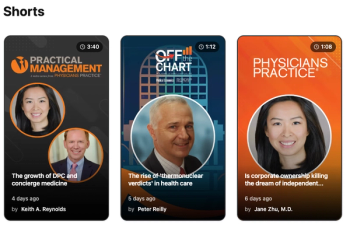
Burnout, depression, and suicide among physicians
A conversation on physician well-being
Physician burnout is a problem. So is physician suicide. But often, the way we conflate these two crises are not accurate, and do damage to efforts to confront the problems. Medical World News® sat down with Christine Yu Moutier, MD, chief medical officer for the American Foundation for Suicide Prevention, to discuss these topics. The transcript below was edited for length and clarity.
Medical World News® (MWN):
Can you discuss some of the key differences between physician burnout, depression and suicide? Sometimes those get lumped together, but they’re not necessarily the same thing. Can you explain?
Yu Moutier: I’m really glad that you’re asking the question in that way. As a national suicide prevention expert … I actually got my start and my interest in suicide prevention more broadly, in my own personal and professional experiences as a medical student or resident, and then a dean in the medical school at University of California, San Diego, where I was really doing my best at that local institution level to address well-being, as well as suicide prevention for the medical students, residents and faculty physicians. And I think there has been a lot of conflation of any form of distress. The research is very weakly linked … . We’ve just published some data that show that among health workers and trainees who have burnout alone, depression alone, or the combination of burnout and depression, it’s really only the group that has depression present, whether burnout is present or not, that has those higher risk factors for suicide such as suicidal ideation.
MWN: Do you think it’s helpful? Or is it harming the conversation to sometimes group these together?
Yu Moutier: I think the main thing that we worry about when it’s all lumped into one big, conflated grouping is that the key difference between depression and burnout is that depression is a very serious medical illness that has potentially life-threatening consequences, if not addressed, and well-researched treatments that can be used to bring depression to bear. And so, what we worry about is that if, say, a physician who is truly severely depressed is only being recognized by himself or herself or by someone who is trying to support that person as being burned out, they may or may not make a referral to actual treatment. …
Self-care strategies and peer to peer, and debriefing — all of those things are essential … for all of us. But we wouldn’t want to miss the opportunity to effectively address and treat the medical illness of depression.
MWN: Just how powerful is that stigma attached to mental health care in relation to ability to practice medicine?
Yu Moutier:I think the stigma is still alive. And there’s a lot of confusion. And there are a lot of current and historical reasons that those barriers are still in place. … The bottom line is that mental health is a part of human health, just like physical health is. And we would never [assume] that a physician with diabetes or hypertension, or cancer or other physical health problems, produce an absolute 100% of the time. We know that there are gradations of symptoms and different ways that different types of symptoms might affect a physician’s performance, depending on their scope of practice. And that is a very … nuanced thing. And in fact, most physicians, especially the older we are … the more likely we all are to be managing one or more medical and/or psychiatric conditions. And there should not be an assumption of impairment unless there’s evidence of that. I think that’s … one great misunderstanding that we need to really reframe and correct.
MWN: What would you like to say to primary care physicians about this topic?
Yu Moutier: Anyone who is a physician and front-line health worker, especially in primary care, you know better than anyone that you and all of your colleagues are human beings, that mental health is very dynamic, depending on a whole set of factors that relate to things like your genetic loading, your early childhood experiences, all of the things that we know are multifactorial determinants of a complex health outcome, like any of the mental health conditions. … . We can become much more proactive, and it’s not that it’s all on the individual. We need institutional change; we need those questions in the medical licensing and hospital privileging boards to be changed. We need access to treatment that’s confidential and appropriate, all of that. But it also does take our own effort as individuals, not only for ourselves, but to be on the lookout for colleagues whom you might be noticing, who are struggling, and to really take the mindset that we are part of a community together; we can make a difference. We don’t need to be their doctor or therapist, only a colleague and a friend; if we approach someone … we notice isn’t in their usual state of health, to just ask the caring questions, to let them know that you’re there to support them. It should be normal to get the help and support that we need.
Newsletter
Optimize your practice with the Physicians Practice newsletter, offering management pearls, leadership tips, and business strategies tailored for practice administrators and physicians of any specialty.






